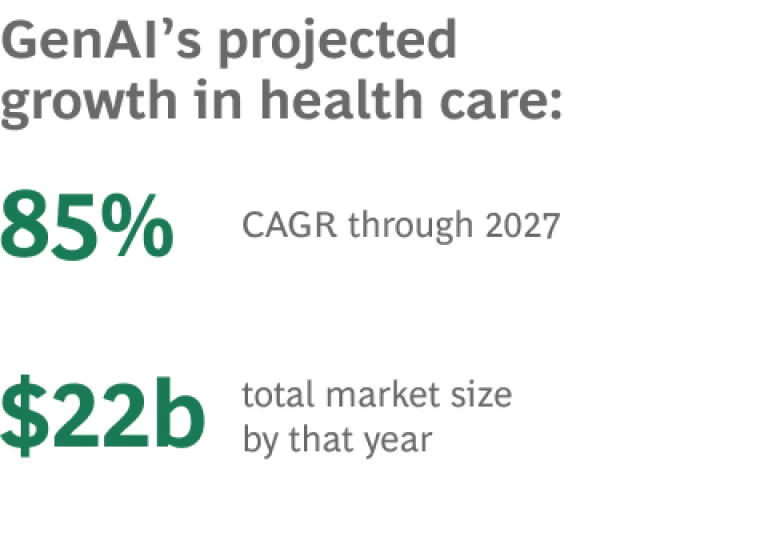Nothing is more personal than health care. And there’s no aspect of our lives where artificial intelligence stands to have a greater impact. Tools like generative AI have extraordinary potential for improving patient outcomes, accelerating drug discovery, and more.
At the same time, no topic better illustrates our discomfort with AI. The prospect of critical health decisions being made for us by algorithms is, for many people, a bridge too far. And AI presents other risks, too, including the possibility of biased outputs, false results, and new threats to patient privacy.
These are legitimate concerns. But we can’t afford to pass up the extraordinary benefits AI can offer. Deployed responsibly, AI systems can enable more accurate diagnostics, more personalized treatment, better care delivery, and greater wellness—all while bringing enormous cost savings for both health care providers and patients. Just as important, by expanding access to health care for underserved populations, AI can be a crucial tool for promoting greater health equity.
A Boon for Research and Development
We’ve already seen the transformative potential of AI in pharmaceutical R&D. The astonishingly rapid development of life-saving vaccines against COVID-19 was fueled in part by robotic automation, AI algorithms, and machine-learning models, which allowed pharma companies to amplify and accelerate their development work.
The arrival of generative AI is further accelerating the discovery of new drugs and treatments. GenAI is improving clinical trial planning and execution processes and enabling more precision therapies—and in the process, it’s making medicine more accessible, affordable, and effective. Companies using generative AI are moving from novel target discovery to FDA drug approval in as little as 18 months while spending only a fraction of what the development and approval process typically costs.

The application of generative AI in the clinical stages will result in a further acceleration of time to market—and as drug development costs decrease, rare indications will become more economically viable. We’ll see other benefits as well. Generative AI will be able to analyze patient data to identify subgroups of patients that are likely to respond to specific treatments. It could also be used to identify how diseases might evolve to become drug resistant, enabling personalized therapies.
Meanwhile, generative AI is likely to transform the regulatory engagement process, both for sponsors and for regulators themselves. Faster development will increase the volume of drugs requiring approvals—and regulators will need employ their own GenAI tools in response.
A Revolution in Diagnosis and Care
AI is gaining significant traction in diagnosing illnesses. Visual AI agents already outperform radiologists at diagnosing some forms of cancer, and many startups and tech giants are working on generative AI-enabled oncology solutions to detect it even earlier.
In the future, generative AI could support real-time patient monitoring which, combined with data analysis to generate personalized insights, could lead to timely interventions before medical conditions worsen. It could also be used to encourage preventive care, wellness, and healthy behaviors via proactive personalized nudges through mobile apps, wearables, and monitoring devices—thus reducing the number of hospital visits.
How AI Is Improving Wellness
- Already, AI-powered wearable devices help people track fitness-related data such as number of steps taken or heart rate.
- AI apps can monitor mental health by engaging users in daily chats to assess their mood, detect signs of stress or depression, and suggest interventions.
- Other AI-powered digital health coaches can help people manage diseases such as hypertension and diabetes.
- Within the next few years, smartphones are likely to gain the ability to detect smells, enabling them to identify diseases like cancer and multiple sclerosis that produce detectable odors and leading to earlier and potentially more effective treatment.
In primary-care settings, AI can improve or replace some physician interactions—flagging issues or sending evidence-based recommendations and reminders prompted by a patient’s electronic health record, for instance. Pharmacies can deploy emotional AI to “listen” to conversations, detect emotional signals, and receive suggestions on how to provide better, more empathetic care to customers. And chatbots trained on GenAI models can deliver accessible and affordable mental health counseling.
Of course, given the emotional dimensions of health, patients will want to hear their diagnoses from human doctors. AI will not replace the human touch.
Transforming the Business of Health Care
Several use cases of generative AI are in development across the health care industry:
Pharmaceutical Firms. Companies are using GenAI to develop mini proteins to treat rare cancers among traditionally underserved population groups. They’re using deep-learning AI and synthetic biology to design new therapeutic antibodies for cancer and immune diseases. And they’re developing machine-learning language models that can generate new protein sequences with specific functions—an innovative tool for new drug design to improve quality and access to affordable treatments.
Meanwhile, Nvidia‘s generative AI cloud service allows biopharma companies to access foundation models in genomics, chemistry, biology, and molecular dynamics. The service provides pretrained GenAI models, but it also enables researchers to fine-tune applications using their own proprietary data.
Medtechs. Generative AI could help companies create more personalized and patient-centered devices such as prosthetics and implants, equipping them with software that provides preventive maintenance and repairs. Generative AI-based platforms can also be used to predict and monitor brain aging, providing insights and tools to diagnose cognitive decline in patients with mental health and neurodegenerative disorders.
Other future applications could enable companies to further collect and analyze data via remote monitoring systems, leading to more effective patient interventions. Quality control applications could also predict when devices and equipment may need repairs, allowing caregivers to schedule maintenance and thus reduce downtime.

Payers and Providers. Payers are starting to leverage generative AI to improve risk management, cost reduction, and member engagement. Examples include automated underwriting and claims management processes and predictive models that identify and proactively manage high-risk segments based on a patient’s medical history, demographics, and social determinants of health—helping prevent and mitigate avoidable conditions and making care more equitable.
In addition to helping providers improve clinical outcomes, generative AI solutions can help maximize resource utilization for both clinical and administrative staff by automating processes such as documentation, claims handling, preauthorization or appeals letters, patient onboarding, and scheduling—thus enabling providers to devote more time to patients.
Public Health. Public health agencies, government ministries, and other health organizations could leverage generative AI to improve resource planning and allocation and to anticipate public health needs—by developing early warning systems for new COVID-19 variants, for example, that can proactively alert researchers, vaccine developers, health authorities, and policy makers.
AI technology could also be leveraged when reviewing the safety and efficacy of drugs, and public health groups could use it to predict disease outbreaks and mobilize resources to minimize impact.
A Responsible Approach to AI and Health
To fulfill AI’s promise, providers and other health care organizations must ensure that generative AI is implemented safely. That means addressing the significant risks AI can pose, including:
- Bias. Because the outputs produced by generative AI systems can reflect inherent biases in the underlying data, companies using AI systems need to assign experts to review the underlying data and results—and correct for any imbalances.
- Misinformation. AI models are still evolving, and they can occasionally produce results that are either misleading or factually incorrect. To build trust, providers will need to ensure that outputs are subject to human review.
- Privacy. Patient data needs to be handled with the utmost care. Companies using generative AI solutions should clarify data ownership with partners, strengthen cybersecurity, and consider developing synthetic data.
- Opacity. The “black box” nature of generative AI systems can be unsettling. Health care organizations will need to build trust by remaining transparent about how the algorithms they use actually work—and how a specific data set leads to a prognosis.
- Misuse. Generative AI outputs can be convincing, but they shouldn’t be taken as the final word on diagnosis. Hospitals, clinicians, and payers should make it clear to patients that AI-generated insights are recommendations, not definitive information.
The arrival of generative AI will undoubtedly lead to extraordinary medical advances. But in the end, health care will come down to what it always has: doctors and patients. Used responsibly, AI can be a powerful tool for both.








